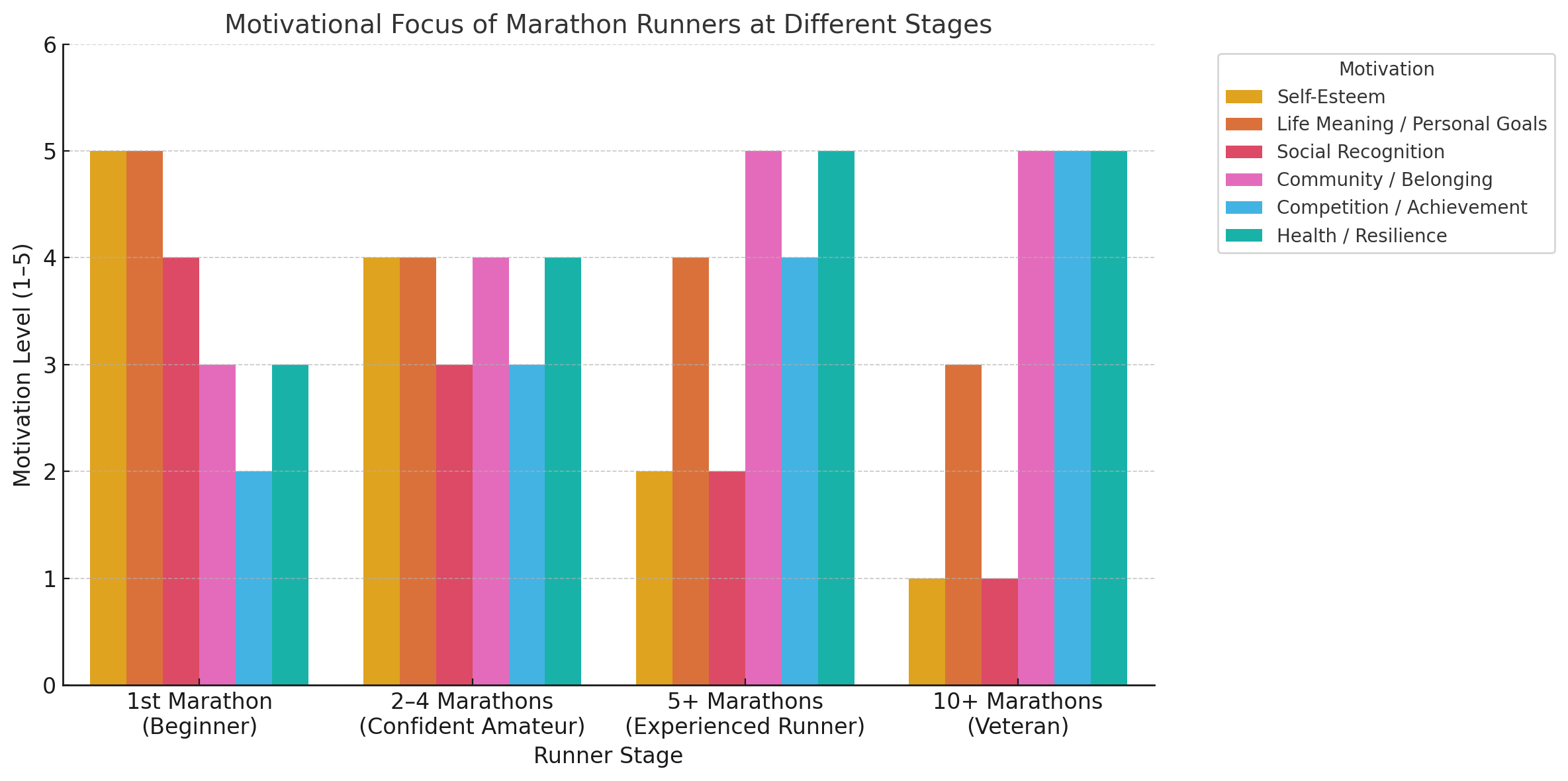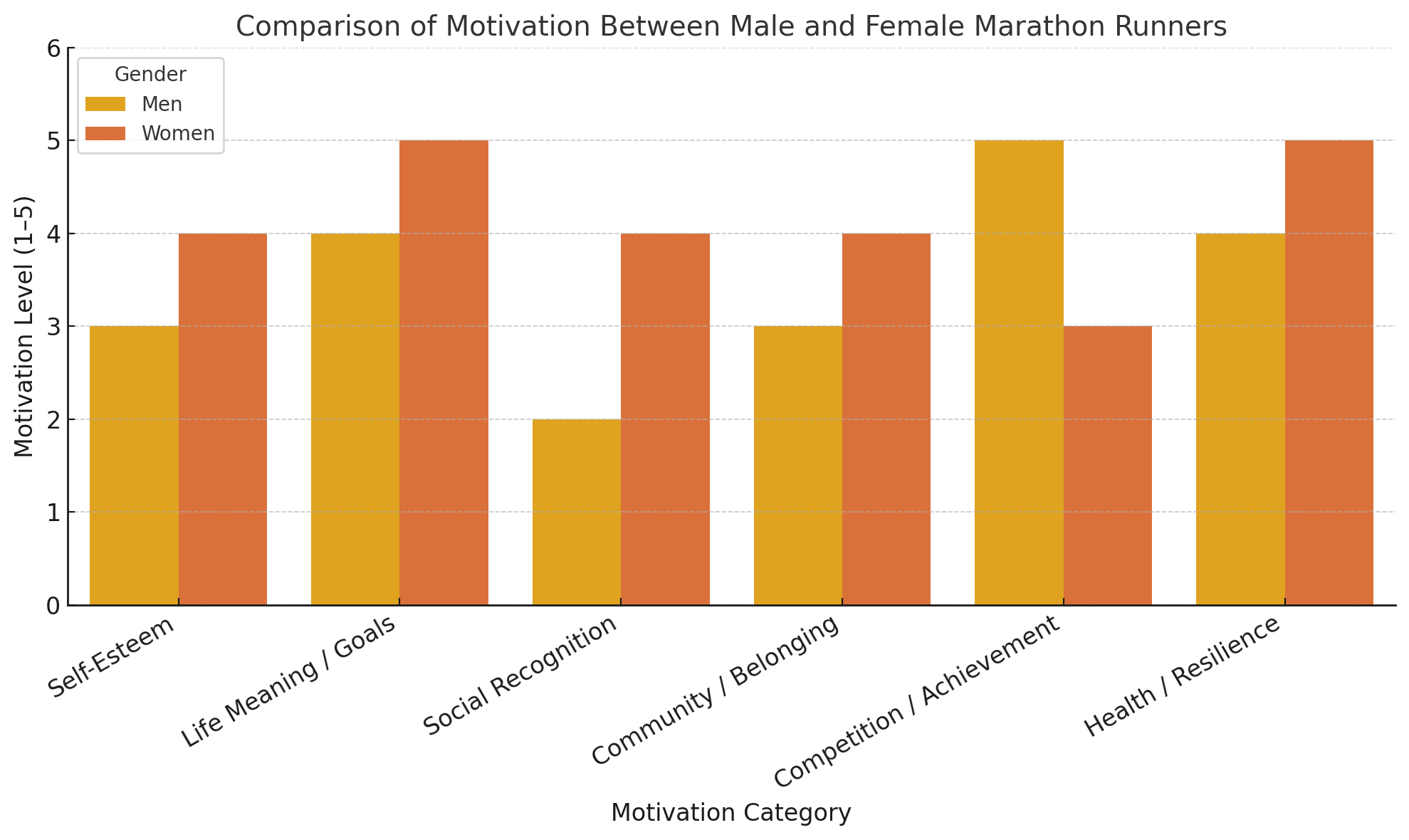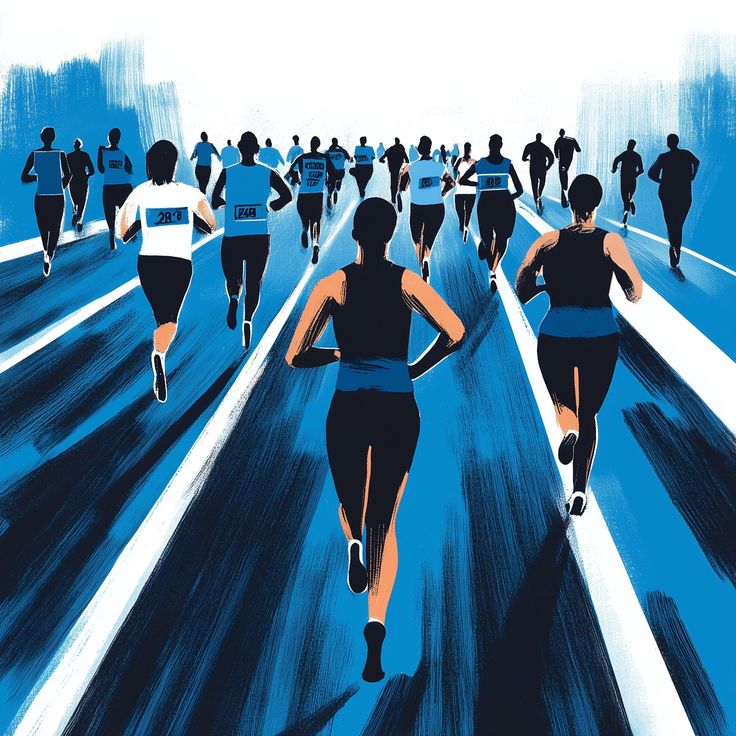Marathon Running on the Rise
In recent decades, the number of marathon runners has increased dramatically. In 1977, around 22,000 people ran marathons in the United States. By 2007, that number had grown to over 400,000. Today, more than 1.1 million people worldwide run at least one marathon each year.
But who are these people?
And what motivates them to conquer 42.2 kilometers — a physically, psychologically, and emotionally exhausting challenge?
But who are these people?
And what motivates them to conquer 42.2 kilometers — a physically, psychologically, and emotionally exhausting challenge?
The Study
In 2015, a team of researchers from Israel and the United States conducted a large-scale study to revisit and update the classic Motivations of Marathoners Scale (MOMS), developed by Masters et al. in 1993.
The original model grouped motivations into four categories: psychological, social, physical and achievement-oriented.
This new study involved 306 amateur marathoners, aged 20 to 77, each of whom had completed at least one marathon (ranging from 1 to 44 races).
The original model grouped motivations into four categories: psychological, social, physical and achievement-oriented.
This new study involved 306 amateur marathoners, aged 20 to 77, each of whom had completed at least one marathon (ranging from 1 to 44 races).
🔑 The 11 Core Motivations of Marathon Runners
The study identified 11 independent motivational dimensions, each playing a unique role in the decision to train for and run a marathon.
1. Emotional Coping
Running helps people deal with anxiety, stress, and emotional overload. It's a form of “self-therapy.” Many runners use it to clear their minds and reset emotionally.
2. Everyday Life Management
For many, running provides structure and order. It brings stability and control — especially important for those dealing with daily stress or imbalance.
3. Life Meaning
Marathons are often symbolic. People run to test their limits and prove they’re capable of something greater. It’s a quest for authenticity and purpose.
4. Self-Esteem
Running builds personal worth: “If I can run a marathon, I can do anything.” This is especially important for beginners or those overcoming personal challenges.
5. Recognition
Some runners seek respect and validation from family, friends, or the sports community. It’s an external confirmation of their value.
6. Affiliation
Marathons are mass events that foster a sense of unity. Running creates community and the feeling of being part of a “tribe” with shared values.
7. Weight Control
For some runners, losing or maintaining weight is a key motivator. Running is seen as an effective way to burn calories and stay in shape.
8. Health – Disease Prevention
Many are motivated by the desire to stay healthy and avoid illness. Running is perceived as a way to strengthen the body and extend life.
9. Health – Physical Fitness
Beyond avoiding illness, others are driven by the goal of staying strong, fit, and energetic — striving for optimal body performance.
10. Competition
Some runners thrive on competition — with others, themselves, or the clock. This motivation appeals to the ambitious and performance-driven.
11. Personal Goal Achievement
One of the most universal drivers: for many, a marathon is a life goal — a symbolic checkbox. Finishing the race is a personal triumph.
🎓 Self-Determination Theory: The Psychological Foundation
The researchers linked these motivations to Self-Determination Theory (ADT), which proposes that human motivation is rooted in three basic psychological needs:
- Autonomy – the desire to be the author of one’s own actions
- Competence – the need to feel capable and effective
- Relatedness – the need to feel connected to others
Each of the 11 motivational factors satisfies one or more of these core needs.

👣 Novice vs. Experienced Marathoners
There are significant differences in motivation between first-timers and seasoned marathoners.
- Novice runners are often motivated by inner proof ("I can do it!"), social recognition, and lifestyle change.
- Experienced runners tend to adopt a more stable, internally driven motivation. For them, running becomes part of their identity, a tool for self-regulation, and a platform for long-term personal goals.


📈 The Runner’s Motivational Journey

Data from the study shows how key motivations evolve as runners gain experience:
- Self-Esteem: Critical at the beginning, but fades in importance over time.
- Life Meaning / Achievement: Strong for beginners and remains high for all.
- Recognition: Important early on but loses relevance as internal goals take over.
- Community: Becomes more important with time and involvement.
- Competition & Performance: Grows with confidence and experience.
- Health & Resilience: Consistently increases, becoming a top motivator for veteran runners.

⚖️ Gender Differences in Motivation
Men and women often differ in what drives them to run:
- Women are more likely to be motivated by self-realization, self-esteem, and social support.
- Men tend to be more driven by competition and achievement.
- Both genders highly value the health and emotional benefits of running.

✅ Conclusion
Marathon motivation isn’t just about wanting to “run” or “stay fit.”
It’s a rich, layered pursuit — a way to find oneself, manage life, earn respect, grow stronger, stay healthy, and feel deeply.
This new, refined model helps us understand the full picture — clearly, systematically, and in a way that’s practical for both science and real life.
The OMY! Sports Team 🟠
